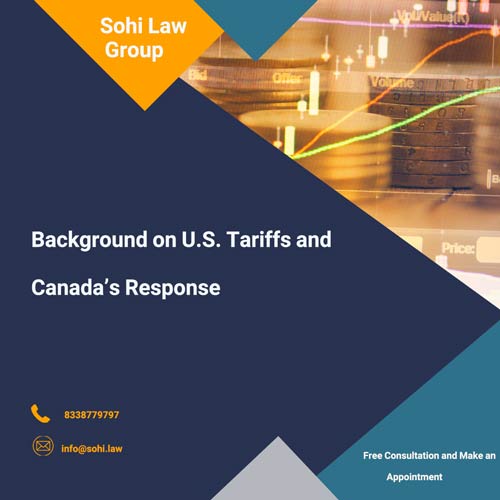Table of Contents
Canada Implements $155 Billion in Retaliatory Tariffs Amid U.S. Trade Tensions
In response to new U.S. tariffs on Canadian exports, Prime Minister Justin Trudeau has unveiled a 25% tariff on $155 billion worth of U.S. goods. This decisive move underscores Canada’s resolve to protect its industries and address what it sees as unfair trade practices. Targeting key sectors like agriculture, automotive, and manufacturing, the measure aims to mitigate economic harm while potentially reshaping cross-border trade dynamics.
The escalating tensions reveal cracks in the historically cooperative Canada-U.S. trade relationship. While the tariffs may bolster domestic production and prompt exploration of alternative markets, they also pose challenges for businesses navigating cost increases and disrupted supply chains. Legal and financial uncertainties abound, urging companies to reassess contracts, compliance, and risk mitigation strategies.
Both nations express a desire for equitable trade practices, leaving the door open for negotiations to de-escalate these measures. Meanwhile, Canada’s proactive stance reflects the complexities of modern trade policy, emphasizing the need for informed strategies to adapt to this evolving landscape.
For those grappling with these developments, legal support from experts such as Sohi Law Group can offer vital guidance on tariff compliance, cost reduction, and dispute resolution, helping businesses minimize disruption and seize new opportunities in this shifting trade environment.
Canada’s $155 Billion Tariff Retaliation: Responding to U.S. Trade Measures
In a significant development reflecting rising tensions in North American trade relations, Prime Minister Justin Trudeau has announced a robust response to the latest tariffs imposed by the United States on Canadian exports. Canada is set to introduce a 25% tariff on $155 billion worth of American goods, a move expected to impact various sectors of trade.
This measure underscores Canada’s commitment to protecting its economic interests while signaling the challenges of maintaining balanced trade relations with its southern neighbor. Below is a detailed exploration of the situation, its implications, and what it may mean for businesses and individuals seeking legal clarity on cross-border trade issues.
Background on U.S. Tariffs and Canada’s Response
The United States has recently adopted tariffs targeting Canadian industries, claiming the measure is necessary for safeguarding domestic economic interests. Historically, the trade partnership between Canada and the United States has been one of mutual benefit, with intertwined supply chains fostering economic growth on both sides of the border.
Prime Minister Trudeau’s decision to impose retaliatory tariffs marks a pivotal shift. His announcement reinforces the government’s determination to protect Canadian industries from what is perceived as unfair trade practices. The $155 billion response is strategically designed to apply pressure on key American exports that directly affect Canadian industry and consumer markets.
A Closer Look at the $155 Billion Tariff Measure
For individuals and businesses with interests on both sides of the border, these developments present new challenges in navigating import-export regulations, understanding cost implications, and ensuring compliance.
Implications for Canadian Businesses and Trade
The 25% tariff, effective immediately, targets a broad range of U.S. goods. While details on specific products have yet to be fully disclosed, sectors such as agriculture, automotive, and manufacturing could see a significant impact. This measured retaliation seeks to counterbalance the negative economic effects Canadian businesses and workers may face as a result of the initial U.S.-imposed tariffs.
The expanded tariff on U.S. goods could lead to higher costs for Canadian businesses reliant on imports, as well as potential shifts in supply chain structures. On the flip side, it may encourage domestic production and the exploration of alternative trade partnerships beyond North America.
However, the uncertainty surrounding trade relations raises concerns for cross-border companies, particularly those with significant exposure to U.S. markets. Key questions arise, such as:
– How will tariffs impact existing contracts and agreements?
– What are the legal rights of Canadian businesses affected by these measures?
– Are there alternative strategies to mitigate financial risks related to rising costs?
What’s Next for Canada-U.S. Trade Relations?
The imposition of tariffs reflects a fracturing dialogue between two historically close trading nations. While both governments express a desire to safeguard their respective industries, such escalations emphasize the need for renewed negotiations. Canada remains open to discussions that could lead to the eventual removal of tariffs from both sides, but this will hinge on the willingness of the U.S. to engage in equitable trade practices.
For Canadian exporters, understanding the evolving landscape will be essential to minimizing disruptions and leveraging any new opportunities that may arise.

Navigating Trade Challenges: How “Sohi Law Group” Can Assist
At Sohi Law Group, we understand that shifts in trade policy can create anxiety and uncertainty for businesses and individuals. Whether you’re a small business owner exploring how tariffs impact your bottom line, a corporation managing cross-border operations, or an individual seeking clarity on trade compliance matters, our legal team is here to help.
Our experienced trade law professionals offer personalized advice and practical solutions tailored to the changing legal and economic environment. Services include:
1. Tariff Classification and Compliance:
Guidance on ensuring your business adheres to the latest import-export laws.
2. Mitigation Strategies:
Helping businesses assess alternatives to reduce the financial impact of tariffs.
3. Legal Representation:
Advocating on behalf of clients in trade disputes and negotiations.
4. Regulatory Updates:
Keeping you informed of legislative changes to ensure operational efficiency.
Sohi Law Group is committed to fostering your success and safeguarding your interests amidst evolving trade policies.
Final Thoughts
Canada’s decision to impose $155 billion in retaliatory tariffs reflects the volatility of modern trade relations. For businesses and individuals with cross-border investments, staying proactive and informed is key to navigating this period of economic uncertainty.
If you have questions or require legal assistance related to international trade or tariffs, contact Sohi Law Group today. Our team is here to provide the legal insights and representation you need to thrive in a challenging trade environment.





No comment